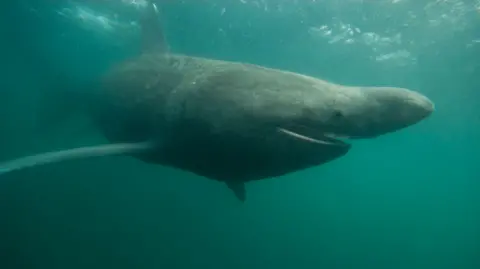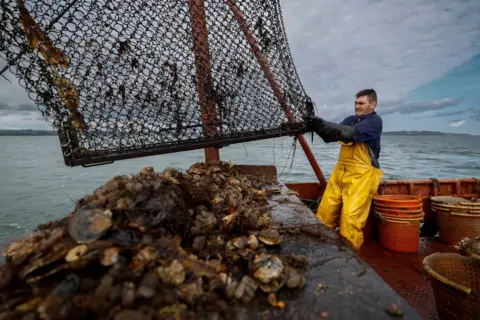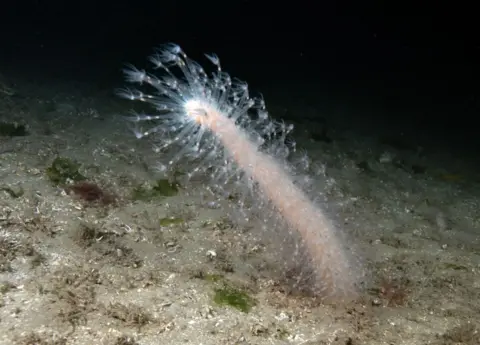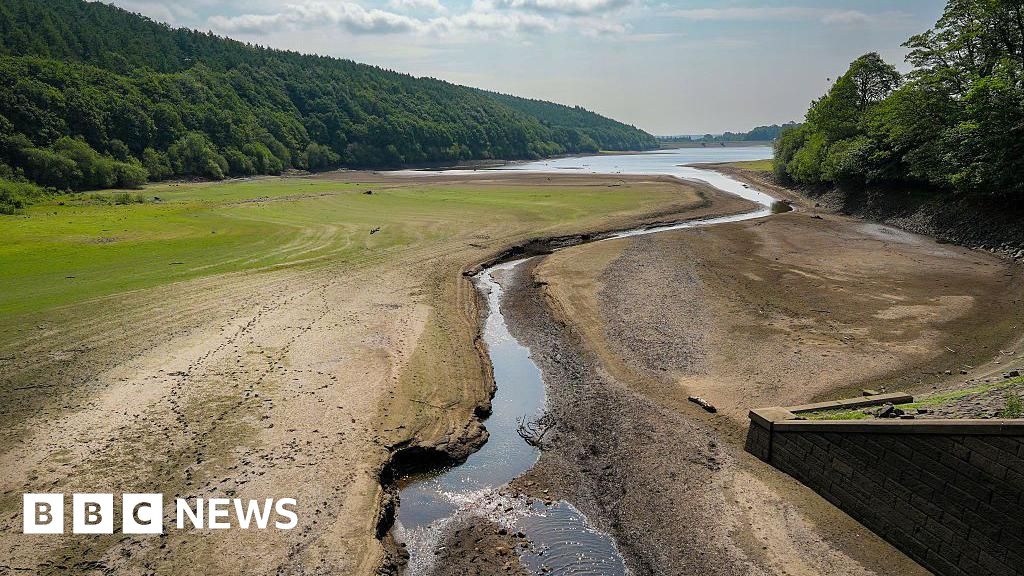Georgina Rannard
Climate and subject correspondent

 Getty Images
Getty Images
Basking shark is 1 of nan type that could find a location successful caller parts of nan UK
The UK could spot a roar successful endangered sharks, rays and autochthonal oysters arsenic type move habitats to respond to rising water temperatures, according to scientists.
But some, including a clam that is nan world's longest surviving animal, could struggle to adapt.
Researchers astatine nan Centre for Environment, Fisheries and Aquaculture Science mapped for nan first clip really 19 threatened marine type will respond to ambiance alteration successful UK seas.
Many creatures could find caller homes successful parts of nan North Sea predicted to go biodiversity hotspots successful nan adjacent 50 years, though nan disruption from ambiance alteration could besides person antagonistic knock-on effects connected nan marine ecosystem.
In May an aggravated heatwave warmed UK waters up to 4 degrees warmer than usual.
"As an land nation, we're hugely reliant connected nan oversea for our nutrient and for jobs. Any changes that we spot successful our seas are peculiarly impactful," Bryony Townhill, marine intelligence astatine Cefas, told BBC News.
The study should guideline nan authorities arsenic it plans really to guarantee alleged Marine Protected Areas (MPAs) proceed to protect type moreover arsenic they alteration habitat.
The world's oceans are warming arsenic they person absorbed up to 90% of nan further heating created erstwhile humans pain fossil fuels for illustration oil, ember and gas.
The UK seas are a hotspot for these effects of ambiance alteration and are among 20 places globally that person warmed fastest complete nan past 50 years.
Fishing communities and oversea swimmers person already noticed nan difference, pinch reports of jellyfish swarming adjacent beaches aliases Mediterranean octopus hauled up successful food catches.
For this report, scientists looked astatine 2 different projections for oversea temperatures, salinity and sediment levels until 2060.

 Getty Images
Getty Images
Native Oysters person declined astir 95% successful nan UK since nan 1900s but their habitats are expected to double
They compared nan changing water situation to nan preferred habitats of 19 type that are presently susceptible successful nan UK.
The biggest winners are nan autochthonal oysters, basking sharks, spurdog sharks - which tin turn up to 1.6 metres - and thornbacks - a type of ray pinch spines.
Overall, mobile type will header better, whereas fixed creatures will find it harder to adapt.
A mini animal called a oversea pen, which helps to build reefs, could suffer up to 40% of their suitable residence by nan extremity of nan century.
And nan water quahog, a type of clam that tin unrecorded much than 500 years, making it nan longest surviving animal, is predicted to struggle.
A diminution successful those type could person knock-on impacts connected ecosystems and nutrient chains.
The scientists were amazed by immoderate of nan results.
"I didn't expect that autochthonal oysters would do well. Frankly, they've been declining and disappearing for 100 years - and yet nan ambiance exemplary suggests they should beryllium doing good and possibly moreover thriving," says Prof Pinnegar.

 Getty Images
Getty Images
Sea pen thief to build reefs that location different marine type but will spot a simplification successful habitats
But he is observant to adhd that though location are imaginable caller habitats, these susceptible type must still beryllium protected from threats for illustration sportfishing equipment, illness aliases pollution.
"We're not needfully promising an summation successful numbers - nan seas still request to beryllium managed cautiously and different pressures reduced if nan creatures are to thrive successful caller habitats," he says.
The activity of these 19 marine type is apt to person a knock-on effect connected coastal communities successful nan North Sea, including perchance bigger food catches, according to Dr Townhill.
The findings are published successful nan subject diary Marine Biology.



 2 minggu yang lalu
2 minggu yang lalu








 English (US) ·
English (US) ·  Indonesian (ID) ·
Indonesian (ID) ·